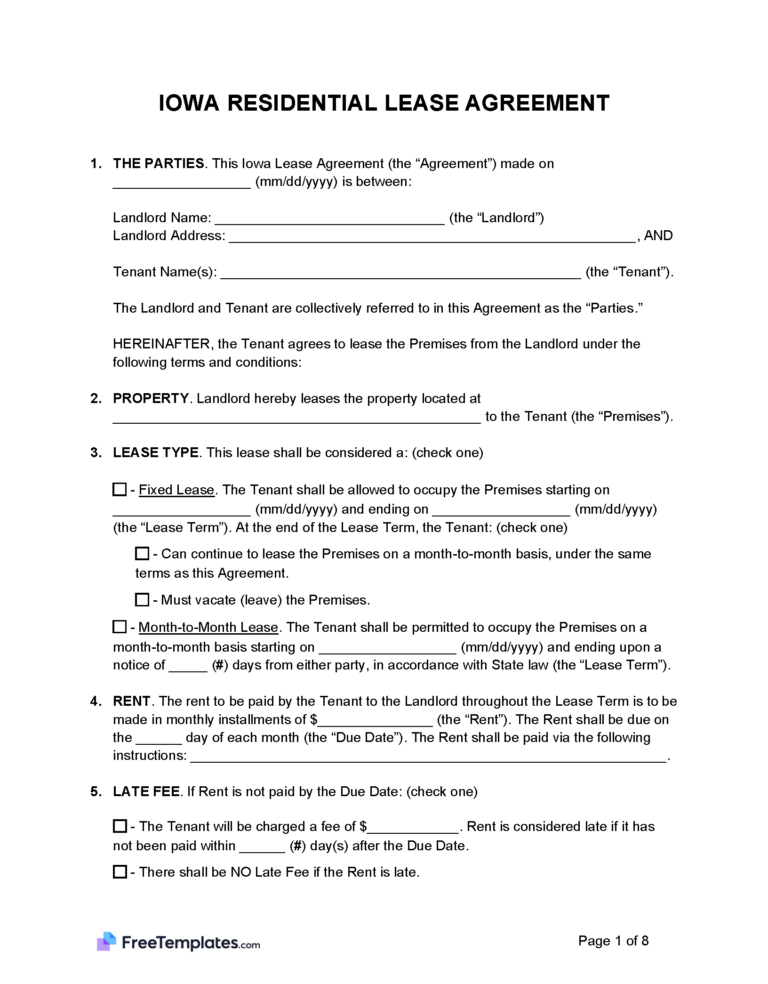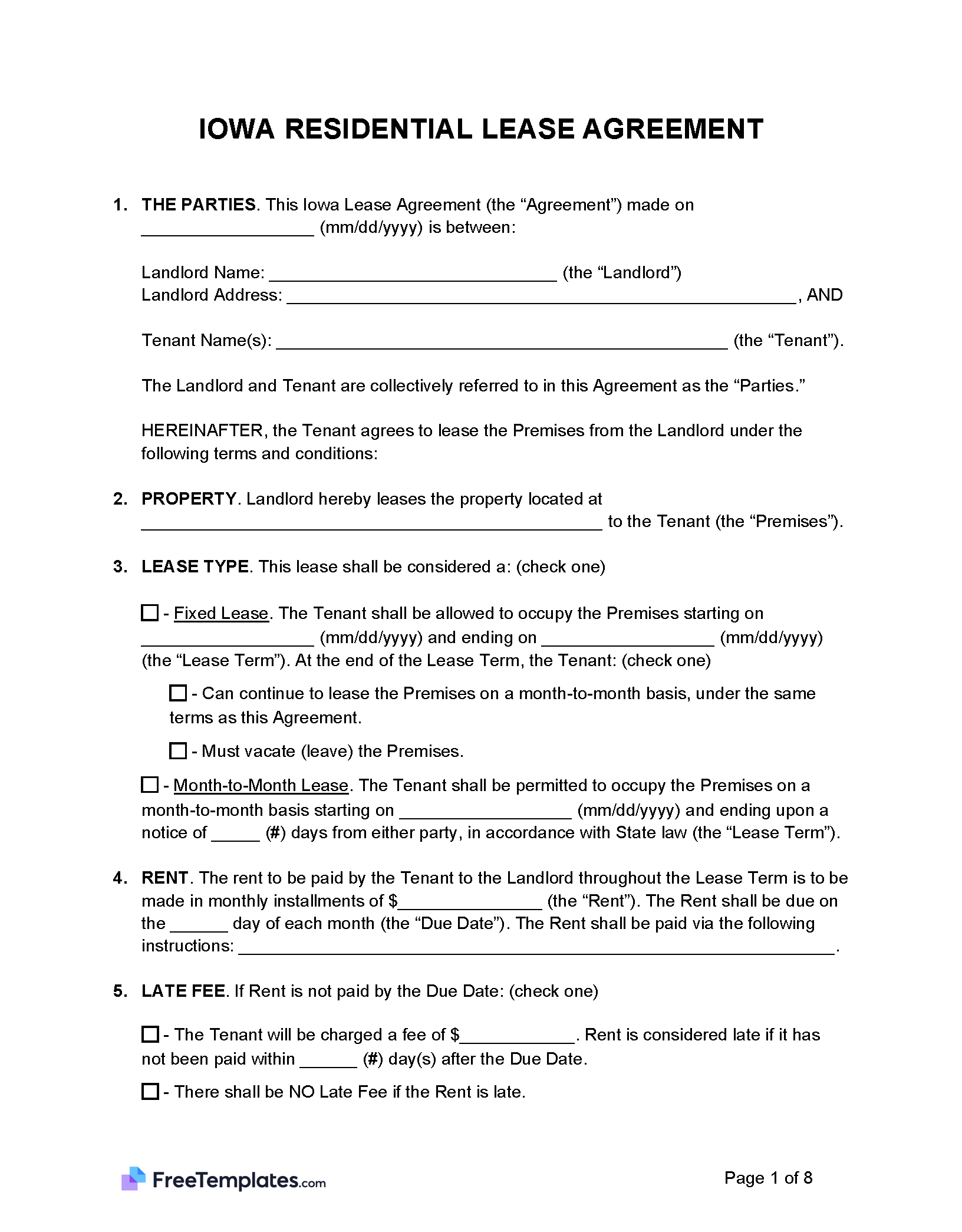By Type (6)
| Standard Lease Agreement – A common contract used to rent a residential property. The landlord and the tenant sign the legal document, typically valid for 12-month terms. |
| Commercial Lease Agreement – A rental arrangement legally binding between a landlord and a business. |
| Month-to-Month Lease Agreement – A legally binding rental housing arrangement in which the landlord or the tenant can terminate the lease agreement with 30-day notice. |
| Rent-to-Own Agreement – A legal document that outlines the terms and conditions of renting a residential unit with the ability to purchase the property at a later date. |
| Roommate Agreement – A living arrangement between individuals who share a common residential property that identifies each person’s responsibilities. |
| Sublease Agreement – Provided the lease does not prohibit it, this is when the tenant rents out all or part of the rental property to a new tenant who is not on the original rental contract. |
Disclosures (5)
Landlord’s Contact Details – Landlords must disclose in writing the name of the person authorized to manage the property and the owner’s address responsible for receiving and issuing notices. (§ 562A.13(1))
Lead-Based Paint Disclosure – With properties built before 1978, federal law mandates that landlords inform tenants of any lead-based paint hazards in the rental unit.
Shared Utilities – The landlord must explain the utility rates charged to the tenants before signing the rental agreement. (§ 562A.13(4))
Rent Increases – Each tenant shall be notified in writing at least 30 days before a rent increase. The effective date cannot precede the lease contract ending or any renewal and/or extension. (§ 562A.13(5))
Comprehensive Environmental Response Compensation and Liability Information System – Landlords must inform tenants if their rental property is listed in the federal Environmental Protection Agency’s system. (§ 562A.13(6))
Security Deposit
Maximum Amount – The landlord cannot collect more than two months’ rent as a security deposit. (§ 562A.12(1))
Collecting Interest – All rental deposits shall be held in a bank, savings and loan association, or credit union. These funds must remain separate from the landlord’s personal funds. Any interest earned on the renter’s deposit in the first 5 years is the landlord’s property. (§ 562A.12(2))
Returning to Tenant – The landlord must return the security deposit or provide a written statement if any funds are being withheld within 30 days of the lease’s end date. The deposit will be mailed to the tenant’s address on file. The notice must specify the nature of the damages, if any. Damages can include not paying rent, restoring the premises to the original condition before the lease, except for everyday wear and tear, and recovering expenses from an eviction. (§ 562A.12(3))
Landlord Access
General Access – For reasons such as maintenance, inspections, or showing the rental unit to prospective buyers or tenants, the landlord must give 24-hour notice to the renters. They should also enter at reasonable times. (§ 562A.19 A(1))
Emergency Access – The landlord can enter the property without consent from the tenants in case of emergency. (§ 562A.19 A(2))
Paying Rent
Grace Period – There is no state-mandated grace period. In Iowa, rent is due on the date disclosed in the lease agreement. Unless specified otherwise, rent is due at the beginning of each term. However, landlords must wait 3 days before starting the eviction process. (§ 562A.9(3))
Maximum Late Fee – The late fee must be detailed in the lease agreement. Under Iowa law, it cannot exceed $12 a day or $60 a month for rent under $700 a month and $20 a day or $100 per month for rent exceeding $700 a month. (§ 562A.9(4))
Returned Checks (NSF) – A nonrefundable fee of $20 may be charged if a tenant’s payment is dishonored. Penalties may apply if the fee is not paid within 15 days. (Iowa Admin. Code r. 657-1.6)
Reasons for Eviction (4)
Non-Payment of Rent – The landlord can issue a 3-day Notice to Pay or Quit if the tenant does not pay rent on the date disclosed in the lease agreement. This gives the renter 3 days to pay the rent in full or vacate the property. If the tenant does neither, the landlord can file an eviction lawsuit. (§ 562A.27(2))
Non-Compliance – The landlord can give the tenant a 7-day Notice to Cure or Vacate for fixable violations. This gives the tenant 7 days to remedy the violation or move out of the rental unit. If the tenant commits another lease violation within 6 months, the landlord can serve a 7-Day Notice to Quit. (§ 562A.27(1))
Holdover – If the tenant remains on the rental property after their lease has ended without the landlord’s consent, the landlord can bring an action for possession. The landlord can recover damages and attorney fees if the holdover is deemed willful and not in good faith. (§ 562A.34(4))
Clear and Present Danger – If the tenant creates a danger to others within 1000 ft of the leased property, the landlord can give the renter a 3-day Notice to Clear and Present Danger. This gives the tenant 3 days to vacate the rental premises. Offenses can include illegal activities, such as drug or firearm-related breaches, or physically assaulting or threatening other tenants, the landlord, or their employees.(§ 562A.27A(3)2)

